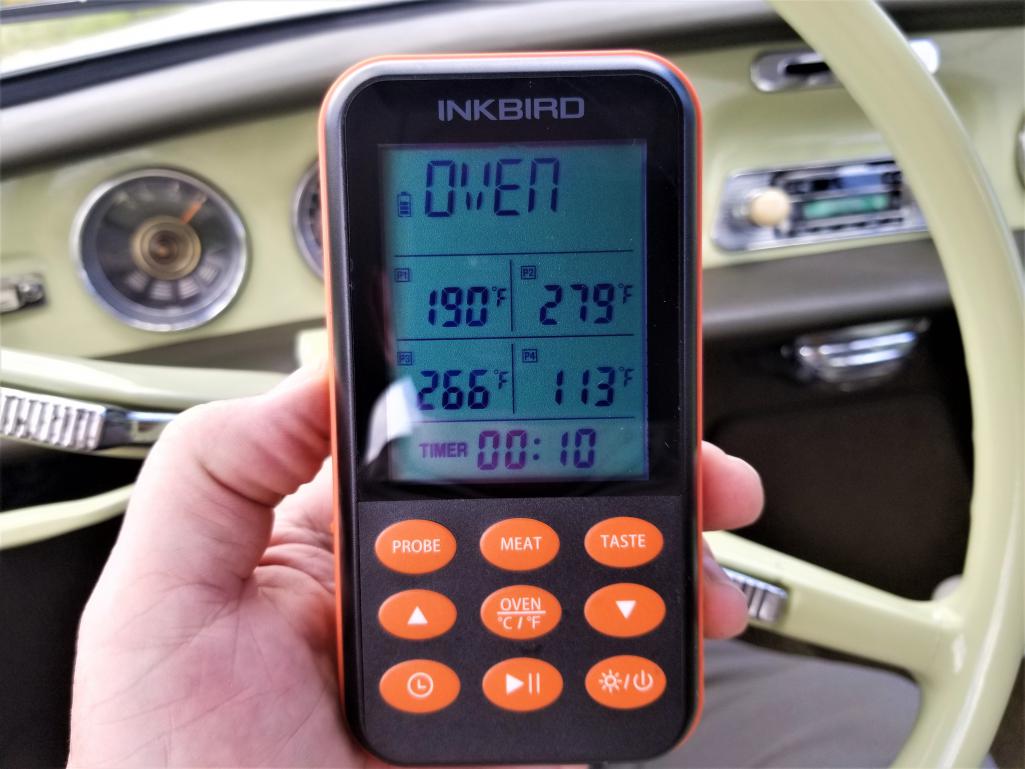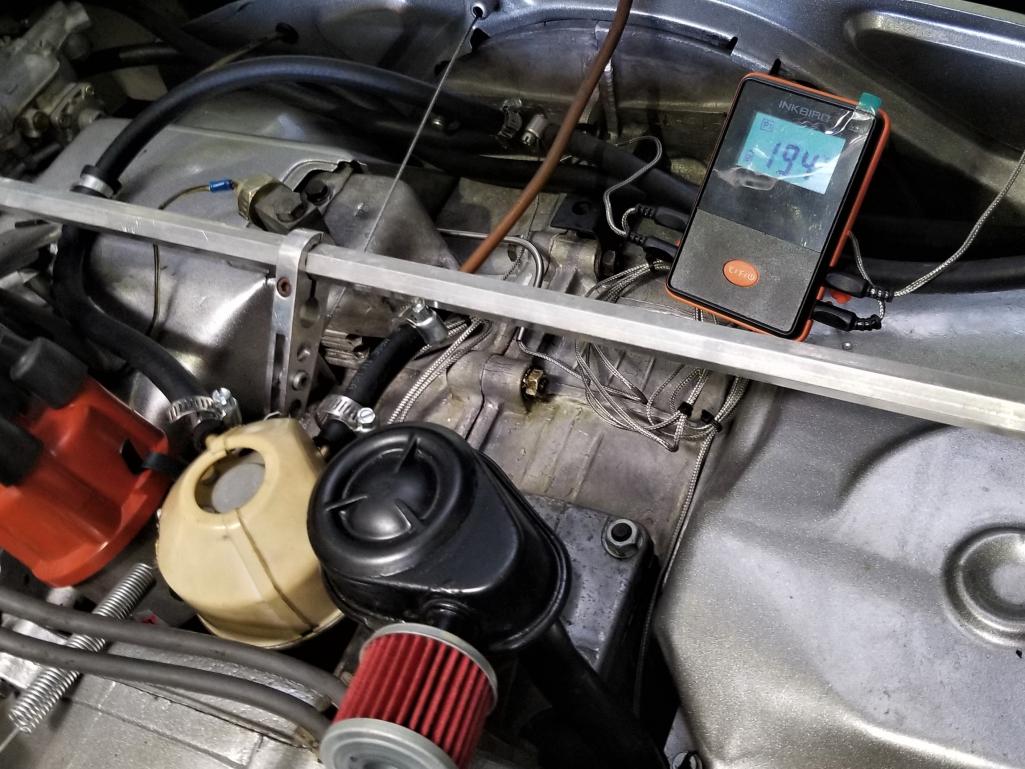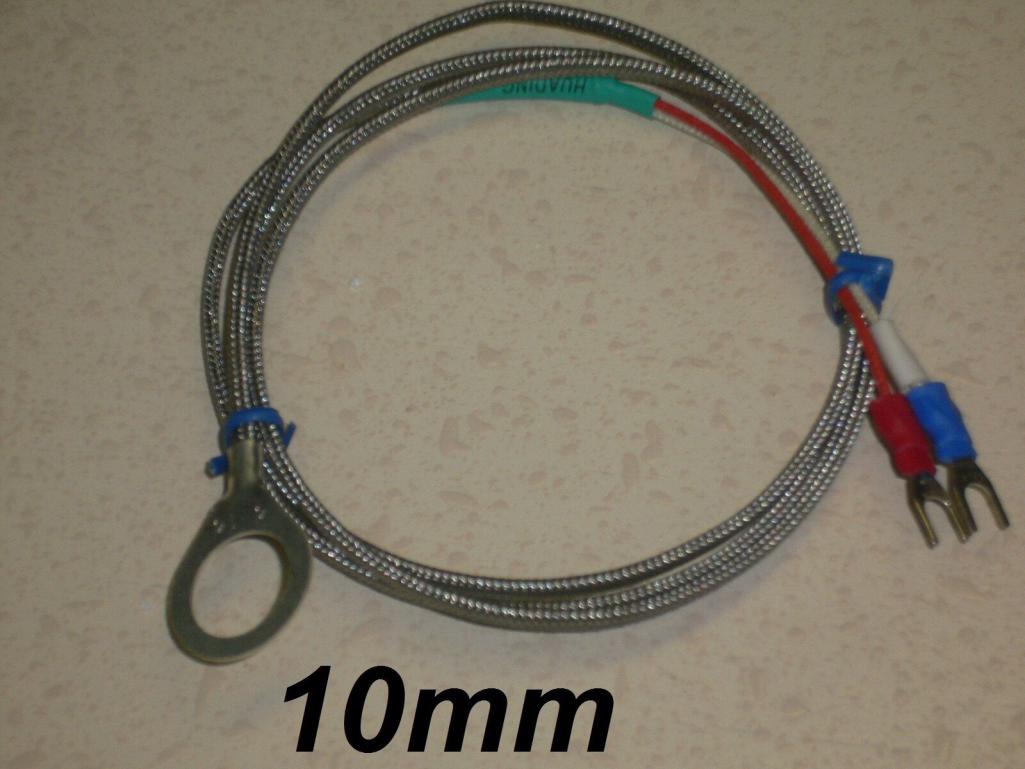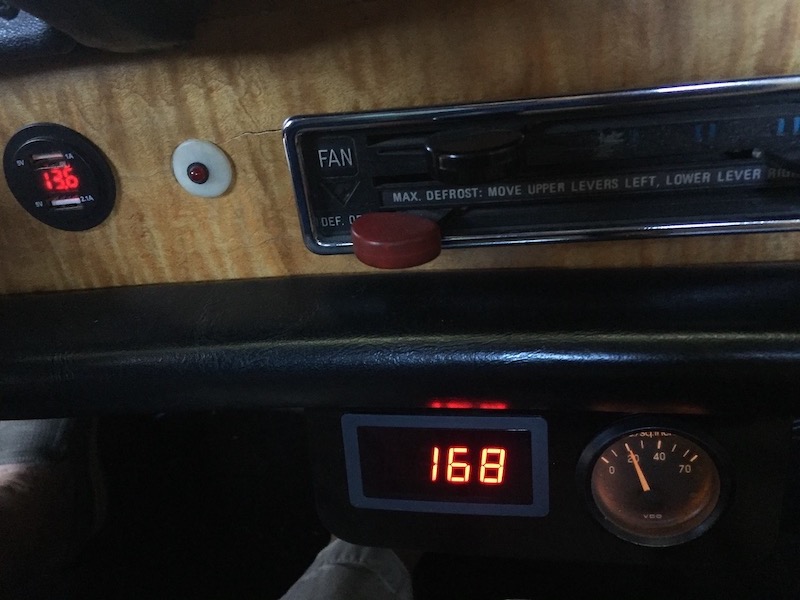|
|

|
Porsche, and the Porsche crest are registered trademarks of Dr. Ing. h.c. F. Porsche AG.
This site is not affiliated with Porsche in any way. Its only purpose is to provide an online forum for car enthusiasts. All other trademarks are property of their respective owners. |
|
|
| Chaznaster |
 May 24 2022, 05:45 PM May 24 2022, 05:45 PM
Post
#1
|
|
Member   Group: Members Posts: 325 Joined: 22-November 15 From: Concord, MA Member No.: 19,389 Region Association: North East States 
|
Hello all. With the weather getting warmer, I have started thinking about getting a handle on my engine temperature. I looked at quite a few discussions on here and most were about interpreting/ calibrating the stock(ish) gauges.
I have no sender at the taco plate and no gauge. I happened on the approach to measure with a dipstick thermometer but it appears those are all NLA. I have a 123 dizzy that transmits temperature but am pretty sure the base of that is far away from the sump and probably not an accurate reading. A few questions: * Is the 123 temperature value good for anything? Maybe there is a conversion? Although I expect it will warm slower and cool faster than the sump in the best case. * What is the most straightforward way (I am OK with some spend and even running wires to the dash) to get a reliable reading? Gauge (VDO or other), thermal camera pointed at the oil pan? Other? I appreciate your guidance ... |
  |
Replies(1 - 19)
| Bullethead |
 May 24 2022, 06:17 PM May 24 2022, 06:17 PM
Post
#2
|
|
Oil Cooled heart    Group: Members Posts: 932 Joined: 24-June 10 From: South Florida Member No.: 11,875 Region Association: South East States 
|
After building a fresh motor for my T34 VW, I used a Bluetooth oven thermometer to monitor essentials. It works great and cost about $50 bucks IIRC.
First temp is oil, second two are heads/cylinders and third is ambient, meaning engine room. Initially it was just for break-in, but I left it in place 'cause it's useful info on trips.   |
| mgphoto |
 May 24 2022, 06:31 PM May 24 2022, 06:31 PM
Post
#3
|
|
"If there is a mistake it will find me"    Group: Members Posts: 1,375 Joined: 1-April 09 From: Los Angeles, CA Member No.: 10,225 Region Association: Southern California |
The 123 is pretty close, oil temp gauge is very slow to react as oil heats slowly. Find the stock sensor and gauge, not that difficult to install.
If you are worried about high temps your best bet is a head temperature sensor, reacts much much faster than oil. |
| VaccaRabite |
 May 25 2022, 05:57 AM May 25 2022, 05:57 AM
Post
#4
|
|
En Garde!           Group: Admin Posts: 13,755 Joined: 15-December 03 From: Dallastown, PA Member No.: 1,435 Region Association: MidAtlantic Region 
|
I would (and do) use a head temp sensor on the #3 spark plug to measure engine temps, instead of oil temp.
Why, you ask? Head temps climb and fall much faster then oil temps. You can have 400+ degree heads and be cooking your motor before the oil temp registers a problem. And you use the #3 spark plug for the sender point as that is (in theory) the hottest cylinder of the engine due to how air moves through the cooling tins. I use a dakota digital gauge for head temps. I have an oil temp gauge in the car, but it currently is not hooked up, and I don't worry about it. Zach |
| barefoot |
 May 25 2022, 06:19 AM May 25 2022, 06:19 AM
Post
#5
|
|
Senior Member    Group: Members Posts: 1,410 Joined: 19-March 13 From: Charleston SC Member No.: 15,673 Region Association: South East States 
|
I'm using very inexpensive TC under the #3 spark plug, very happy with results.
Here's the 10 meter TC, ling enough to connect to under dash gauge & link to the digital gauge itself. Get em on E-Bay.  https://www.ebay.com/itm/324279012120  |
| Jake Raby |
 May 25 2022, 07:33 AM May 25 2022, 07:33 AM
Post
#6
|
|
Engine Surgeon      Group: Members Posts: 9,398 Joined: 31-August 03 From: Lost Member No.: 1,095 Region Association: South East States |
Oil temperature is not engine temperature. It is just oil temperature, and impacted by variables that only impact the oil.
The 123 gives a good indication of crankcase temperature, which is adequate in a water-cooled engine, but not very indicative of anything with our engines, where cylinder head temperatures make or break the engine. My article on engine temperatures is still somewhere here on 914 World, it gives some good information. |
| SavingManuals |
 May 25 2022, 10:16 AM May 25 2022, 10:16 AM
Post
#7
|
|
Member   Group: Members Posts: 100 Joined: 5-January 21 From: Metro Detroit Member No.: 25,044 Region Association: None 
|
Oil temperature is not engine temperature. It is just oil temperature, and impacted by variables that only impact the oil. The 123 gives a good indication of crankcase temperature, which is adequate in a water-cooled engine, but not very indicative of anything with our engines, where cylinder head temperatures make or break the engine. My article on engine temperatures is still somewhere here on 914 World, it gives some good information. Found this: "914 Info" page -> Technical Articles -> » Type IV Cylinder Head Temperatures - by Jake Raby |
| Lockwodo |
 May 25 2022, 11:09 AM May 25 2022, 11:09 AM
Post
#8
|
|
Member   Group: Members Posts: 214 Joined: 23-December 21 From: Santa Cruz, Californnia Member No.: 26,193 Region Association: Northern California 
|
Oil temperature is not engine temperature. It is just oil temperature, and impacted by variables that only impact the oil. The 123 gives a good indication of crankcase temperature, which is adequate in a water-cooled engine, but not very indicative of anything with our engines, where cylinder head temperatures make or break the engine. My article on engine temperatures is still somewhere here on 914 World, it gives some good information. Found this: "914 Info" page -> Technical Articles -> » Type IV Cylinder Head Temperatures - by Jake Raby Very good! I just ordered the gauge and spark plug thermocouple. |
| emerygt350 |
 May 25 2022, 12:55 PM May 25 2022, 12:55 PM
Post
#9
|
|
Advanced Member     Group: Members Posts: 2,992 Joined: 20-July 21 From: Upstate, NY Member No.: 25,740 Region Association: North East States |
I had a hard time finding the info link, so here is the direct link.
http://914world.com/specs/JakeRabyHeadTemps.php Jake, cruising around town mine stays below 300, sometimes as low as 220 to 230. I assume that is normal. At 75 on the highway in 5th it's around 340 to 350, up to 375 climbing. That seems like "normal" in your article but I haven't had it out in high heat yet. What ambient temps were are you normally driving around in or does it not matter so much? |
| Jake Raby |
 May 25 2022, 01:50 PM May 25 2022, 01:50 PM
Post
#10
|
|
Engine Surgeon      Group: Members Posts: 9,398 Joined: 31-August 03 From: Lost Member No.: 1,095 Region Association: South East States |
I had a hard time finding the info link, so here is the direct link. http://914world.com/specs/JakeRabyHeadTemps.php Jake, cruising around town mine stays below 300, sometimes as low as 220 to 230. I assume that is normal. At 75 on the highway in 5th it's around 340 to 350, up to 375 climbing. That seems like "normal" in your article but I haven't had it out in high heat yet. What ambient temps were are you normally driving around in or does it not matter so much? Ambient temps sadly effect CHT, but greatly impact oil temp. Some oils like running higher oil temps, and perform better at those temps. You CHT seems fine, especially on today's fuel that create higher running temps than I've ever experienced before. |
| Lockwodo |
 May 25 2022, 05:30 PM May 25 2022, 05:30 PM
Post
#11
|
|
Member   Group: Members Posts: 214 Joined: 23-December 21 From: Santa Cruz, Californnia Member No.: 26,193 Region Association: Northern California 
|
Oil temperature is not engine temperature. It is just oil temperature, and impacted by variables that only impact the oil. The 123 gives a good indication of crankcase temperature, which is adequate in a water-cooled engine, but not very indicative of anything with our engines, where cylinder head temperatures make or break the engine. My article on engine temperatures is still somewhere here on 914 World, it gives some good information. Found this: "914 Info" page -> Technical Articles -> » Type IV Cylinder Head Temperatures - by Jake Raby Very good! I just ordered the gauge and spark plug thermocouple. Could someone comment on the best routing for the wire from the thermocouple under plug #3 to the gauge installed on the dash? Preferably a graphic of some sort or description would be great. Thanks |
| michael7810 |
 May 25 2022, 06:51 PM May 25 2022, 06:51 PM
Post
#12
|
|
Senior Member    Group: Members Posts: 1,082 Joined: 6-June 11 From: Scottsdale, AZ Member No.: 13,164 Region Association: Southwest Region 
|
Sorry no pics but I was able to run dual CHTs and Air/Fuel meter wires thru the tunnel. I ran the wires thru the speedo cable hole in the back (removed the big rubber seal and sealed around the wires with silicone when done). I exited the tunnel in the front and routed the wires under the center carpet piece to the dash. Nice clean install without making new holes.
|
| FlacaProductions |
 May 25 2022, 06:59 PM May 25 2022, 06:59 PM
Post
#13
|
|
Senior Member    Group: Members Posts: 1,966 Joined: 24-November 17 From: LA Member No.: 21,628 Region Association: Southern California 
|
Same there - went through the speedo hole.
|
| Chaznaster |
 May 25 2022, 07:19 PM May 25 2022, 07:19 PM
Post
#14
|
|
Member   Group: Members Posts: 325 Joined: 22-November 15 From: Concord, MA Member No.: 19,389 Region Association: North East States 
|
Wow. Great input - thanks so much to all!
@Jake - your article is pure gold. I plan to go with the TC under the plug on #3 and will report back … |
| Lockwodo |
 May 25 2022, 09:16 PM May 25 2022, 09:16 PM
Post
#15
|
|
Member   Group: Members Posts: 214 Joined: 23-December 21 From: Santa Cruz, Californnia Member No.: 26,193 Region Association: Northern California 
|
Sorry no pics but I was able to run dual CHTs and Air/Fuel meter wires thru the tunnel. I ran the wires thru the speedo cable hole in the back (removed the big rubber seal and sealed around the wires with silicone when done). I exited the tunnel in the front and routed the wires under the center carpet piece to the dash. Nice clean install without making new holes. Excellent, thanks! |
| VaccaRabite |
 May 26 2022, 07:09 AM May 26 2022, 07:09 AM
Post
#16
|
|
En Garde!           Group: Admin Posts: 13,755 Joined: 15-December 03 From: Dallastown, PA Member No.: 1,435 Region Association: MidAtlantic Region 
|
My thermocouple wire goes to the head via the stock CHT hole in the tins between cyl3 and cyl4. And like the others the wire runs up the tunnel following the rest of the main wire harness.
Note that you will need to put a small groove in the head to allow the TC to seat properly. It will be obvious when you try to install it. This means you need to take the shroud off that side of the motor. A PITA in the car, but it can be done (I have done it). 5 minutes with a dremel or a die grinder and you are set. Zach |
| Lockwodo |
 May 26 2022, 08:08 AM May 26 2022, 08:08 AM
Post
#17
|
|
Member   Group: Members Posts: 214 Joined: 23-December 21 From: Santa Cruz, Californnia Member No.: 26,193 Region Association: Northern California 
|
My thermocouple wire goes to the head via the stock CHT hole in the tins between cyl3 and cyl4. And like the others the wire runs up the tunnel following the rest of the main wire harness. Note that you will need to put a small groove in the head to allow the TC to seat properly. It will be obvious when you try to install it. This means you need to take the shroud off that side of the motor. A PITA in the car, but it can be done (I have done it). 5 minutes with a dremel or a die grinder and you are set. Zach Hmm - so the thermocouple ring has a shank where the wire attaches. Does the shank not clear the bottom of the spark plug? |
| 930cabman |
 May 26 2022, 08:12 AM May 26 2022, 08:12 AM
Post
#18
|
|
Advanced Member     Group: Members Posts: 4,168 Joined: 12-November 20 From: Buffalo Member No.: 24,877 Region Association: North East States 
|
Is anyone using the tapped hole the factory used for the CHT sender? Seems like an easy location to grab the head temp
|
| GregAmy |
 May 26 2022, 08:54 AM May 26 2022, 08:54 AM
Post
#19
|
|
Advanced Member     Group: Members Posts: 2,505 Joined: 22-February 13 From: Middletown CT Member No.: 15,565 Region Association: North East States 
|
Hmm - so the thermocouple ring has a shank where the wire attaches. Does the shank not clear the bottom of the spark plug? The spark plug hole is spot-faced into the casting, leaving a ledge around its perimeter. That ledge must be notched. Is anyone using the tapped hole the factory used for the CHT sender? Seems like an easy location to grab the head temp Nowhere near as responsive and accurate as the spark plug, because much more mass of casting between that spot and the combustion chamber. Plus, the stock CHT location is getting some cooling airflow. I use the stock CHT location with my Megasquirt setup for "warm up adjustment", but I log actual CHT using the spark plug thermocouple. The spark plug location is very responsive to throttle and mixture adjustments, like almost "right now" where the CHT is sloooooow to react. Further, the actual number I read on the CHT spot is about 75-100 degrees cooler at times than the spark plug. Finally, all prior history of discussions of Cylinder Heat Temperature (such as the Raby link above) are done in the context of the spark plug thermocouple. So "CHT" is good for warm-up adjustments, but spark plug temp gives you the best real time status and tuning info. GA |
| Jake Raby |
 May 26 2022, 09:17 AM May 26 2022, 09:17 AM
Post
#20
|
|
Engine Surgeon      Group: Members Posts: 9,398 Joined: 31-August 03 From: Lost Member No.: 1,095 Region Association: South East States |
QUOTE Is anyone using the tapped hole the factory used for the CHT sender? Seems like an easy location to grab the head temp This is the worst place to gather CHT data. I have been preaching this for 20 years, and people won't listen. This location is made for the stock CHT sensor and was chosen by the factory so it would NOT see full CHT temperature, which would kill the sensor. It was also chosen to stay hot longer (why it is not finned) so when the engine is shut down, it does not go back to cold start prematurely. I have tested this location simultaneously with the spark plug locations, and have seen it be 50*F low at a CHT of 250F, but after the spark plug area reaches 400F it can be more than 125*F low. This is exactly why the factory chose this location for the stock CHT sensor. I spent a decade developing T4 cooling systems, and at times I would cover an engine with 28 thermocouples, with sometimes 6 being fitted per cylinder/ head, then drive the car 3,450 miles at an average speed of 76 MPH across the country while data logging it all. During this I proved that the stock CHT sensor location is a foolish place for a CHT thermocouple. People always look for the easier way, and they give up everything in that quest. Go under the spark plug, or don't even bother with monitoring CHT~ |
  |
1 User(s) are reading this topic (1 Guests and 0 Anonymous Users)
0 Members:

|
Lo-Fi Version | Time is now: 7th July 2025 - 04:21 AM |
Invision Power Board
v9.1.4 © 2025 IPS, Inc.








